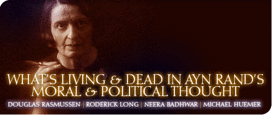Some things are not as clear as our good editor thinks. So, in response to his pot-stirring, I offer these brief comments—each of which requires much greater development than I can provide here.
First, strictly speaking, Rand’s “Causality Versus Duty” does not require an instrumentalist reading of morality. See my previously cited essays in the Journal of Ayn Rand Studies on the pre-moral choice issue.
Second, instrumentalist reasoning and practical wisdom are not the same. Aristotle notes that prudence is not “cleverness.” See Den Uyl’s previously cited The Virtue of Prudence.
Third, I find the survivalist-reading of Rand most implausible. Unless one engages in what Rand called a “floating abstraction,” the claim that life is the ultimate end means “life as the kind or sort of thing something is.” There is no such thing as denatured or abstract life for Rand. One must understand her ethics in the context of her ontology — to exist is to be something or, as Rand prefers, “existence is identity.” I think this is the point of “qua man.”
Fourth, Rand’s Aristotelianism is what makes her intellectually interesting, and not just another contractarian. (By the way, does Adam Smith see human beings as merely instrumentalist reasoners? I think not.)
Fifth, egoism need not be instrumentalist, see Lester Hunt’s important essay, “Flourishing Egoism,” Social Philosophy & Policy 16.1 (Winter 1999): 72-95 and Tibor Machan’s discussions of classical egoism in his many works. Sixth, if moral dualism holds that there are two basic, but fundamentally different standards (with no connection between them), then this is a most unstable ethical view. Moreover, it must be shown why there are two basic moral standards. (Den Uyl and I discuss these problems towards the end of chapter 9, “Self-Ownership,” in Norms of Liberty.)
Seventh, Rand’s discussion of rights is her basic way of discussing the social nature of morality, because rights provide the rules of the game, and this provides the context for both instrumentalist reasoning and prudence properly understood. But this is strictly speaking only the political/legal dimension of social morality. There is indeed much more to society than politics and law.
Finally, Deidre McCloskey, who is a most interesting thinker, not only conflates instrumentalist reasoning with practical wisdom but also makes the connection between morality and capitalism too close. See Den Uyl’s previously cited, Homo Moralis, for a discussion of these two issues.

